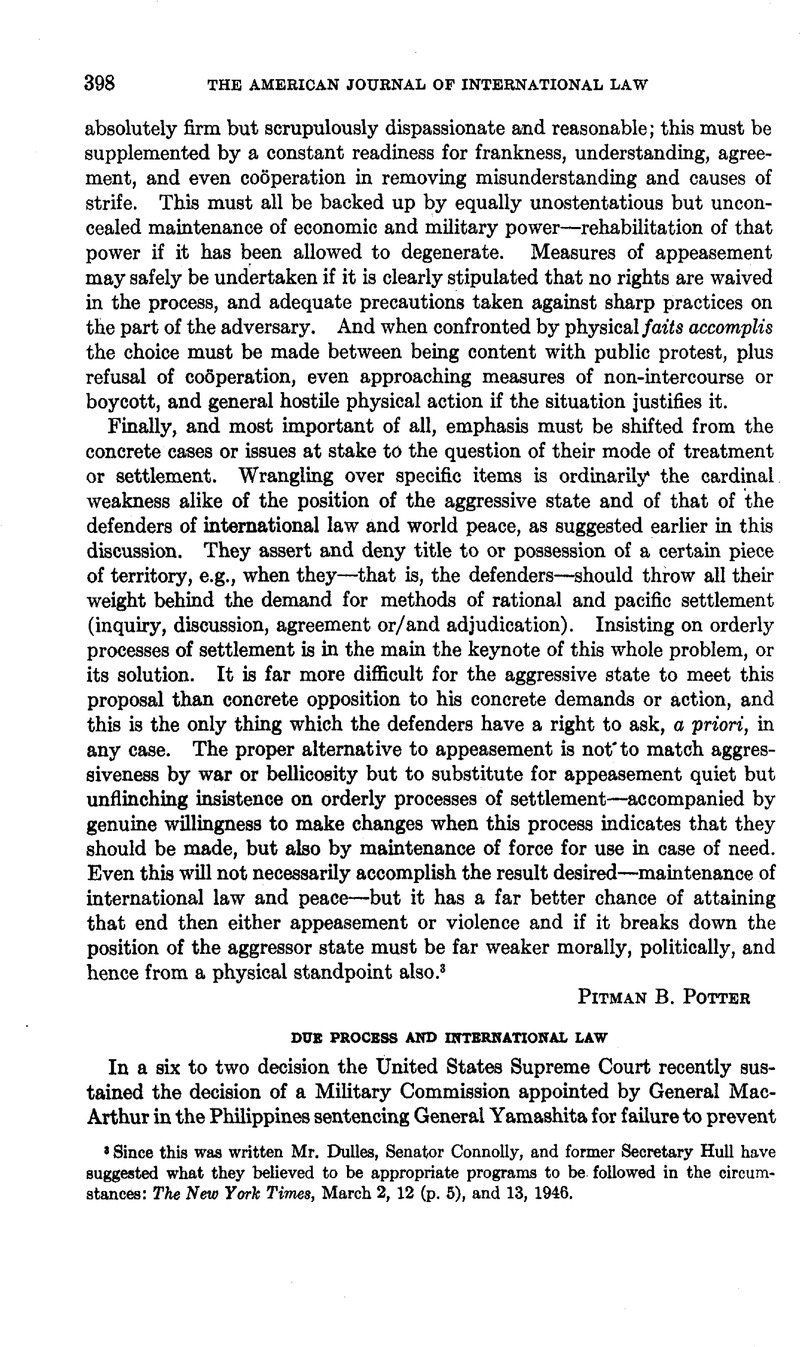Published online by Cambridge University Press: 20 April 2017

1 In re Yamashita, 1946, 66 Sup. Ct. 340, text below, p. 432. Cited hereafter as Case.
1a Case, p. 363.
2 There is nothing novel in this doctrine. The Supreme Court has held that the Constitutional Guarantees do not apply automatically to extraterritorial courts established in pursuance of treaties (In re Rosa, 1890, 140 U. S. 453, 464), to courts in occupied foreign territory (Neeley v. Henkel, 1901,180 U. S. 109,122), or to military commissions (Ex parte Vallandingham, 1863,1 Wall. 243; Ex parte Quirin, 1942, 317 U. S. 1). It has even been held that they do not automatically apply in annexed territories not yet incorporated into the United States (Hawaii v. Manhichi, 1903,190,197; Dorr v. U. S., 1904, 195 U. S. 138) although the court “suggested” that “certain natural rights (including the right to due process of law) enforced in the Constitution by prohibition against interference with them “ may be guaranteed in unincorporated territory but “what may be termed artificial or remedial rights which are peculiar to our own system of jurisprudence” are not. (Brown, J., in Dowries v. Bidwell, 1901, 182 U. S. 244, 282).
2a Case, p. 350.
2b P. 353.
2c P. 378.
3 It has been held that Constitutional guarantees do not prevent condemnation without compensation of enemy property in prize courts (The Prize Cases, 1862, 2 Black 665), or even in ordinary courts (Miller v. V. S., 1870, 11 Wall. 268, 307; U. S. v. Chemical Foundation, 1926, 272 U. S. 1, 11).
4 Note 2 above.
5 “The propriety of governmental acts should be put to the test of international standards.” Neer case (U. S. v. Mexico, 1927, Opinion of the Commissioners, p. 71; Green Hackworth, Digest of International Law, Vol. 5, p. 528.
5a Case, p. 345.
6 “The Minimum Standard of the Treatment of Aliens,” in Proceedings of the American Society of International Law, 1939, p. 61.
7 Institute of International Law, 1927, this Journal, Vol. 23 (1929), Special Supplement p. 229.
8 Harvard Research in International Law, Draft Convention on Responsibility of States, Art. 9, this Journal, Vol. 23 (1929), Special Supplement, p. 173; Hackworth, Vol. 5, p. 527.
9 Harvard Research, Draft Convention on Jurisdiction with respect to Crime, Art. 12, this Journal, Vol. 29 (1935), Supplement, p. 596.
10 Statement of Essential Human Rights by committee representing principal cultures of the world appointed by the American Law Institute, 1944, Arts. 7, 8, 9.
10.1 Diplomatic Protection of Citizens Abroad, 1919, p. 100.
10a Case, p. 346.
10b P. 362.
10c P. 349.
10d P. 359.
10e P. 351.
11 Manley O. Hudson, The Permanent Court of International Justice, 1920–1942, p. 571.
12 “With responsibility for the ascertainment of facts vested in professional judges, the stress will be shifted from the crude technique of admitting or rejecting evidence to the more realistic problem of appraising its credibility.” C. T. McCormick, “Evidence,” in Encyclopedia of the Social Sciences, Vol. 5, p. 646. See also A. H. Feller, “Evidence, Modern Civil Law,” in same.
13 Only “unreasonable,” “unfair,” or “arbitrary” discriminations against aliens are forbidden. See Harvard Research, Draft Convention on Responsibility of States, Art. 5, this Journal, Vol. 23 (1929), Special Supplement, pp. 147,184; American Law Institute, Essential Human Rights, Art. 17; United Nations Charter, Art. 1, par. 3; notes 7, 9 above.
13a Case, p. 352.
13b P. 368.
13c P. 345.
13d P. 351.
13e P. 353.
14 Notes 8–11 above.
15 Rule 2a and statement of Presiding member, Opening Session, Berlin, Oct. 18, 1945; Record, Session, Nuremberg, Nov. 14,1945. The Geneva Prisoner of War Convention, Art. 60, requires notification of charges and specifications to the protecting power at least three weeks before the opening of the trial.